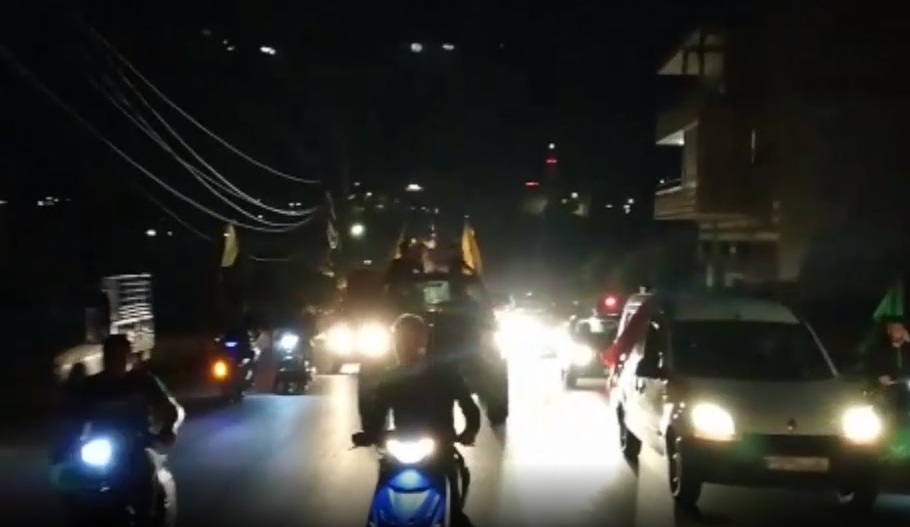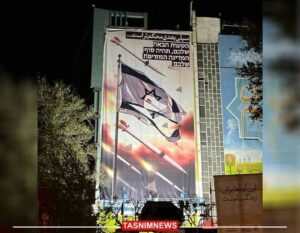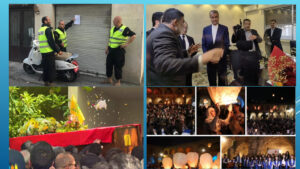[vc_row][vc_column][vc_column_text]On 09/01/19 at 4:15 pm, Hezbollah launched an attack on an Israeli military vehicle using anti-tank “Kornet” missiles, near the Israeli community of Avivim. There were no Israeli casualties in the assault. Hezbollah assumed responsibility for the attack claiming it to be in retaliation for the death of two Hezbollah operatives by an Israeli attack that took place two weeks earlier on the 08/24/19. These Hezbollah operatives were meaning to launch an armed drone into Israel.
Subsequently, after the attack, Alma Center followed and examined the incident’s influence it had on the Lebanese media and its reactions on social media as well. This analysis allowed us to map the different perspectives of the Lebanese public opinion regarding Hezbollah’s action against the IDF.
An overview of Hezbollah’s social networking, media outlets and statements by senior Hezbollah personnel, show an attempt to present euphoria and satisfaction on the Lebanese side of the border as opposed to a feeling of fear and panic on the Israeli side.
In addition, Hezbollah aspired to prove that in its response, it succeeded in redefining the deterrence equation created following the July 2006 war against Israel. According to the newly set precedent, Hezbollah reserves the right to respond to all “Israeli aggressions” from any territory bordering Israel, including the full extent of the international recognized border between the two countries and not just from disputed areas, such as Shaba Farms.
As part of their propaganda and war of perception, Hezbollah and its supporters appear to be using the Lebanese media and social networks in order to establish the attack as a success throughout the Lebanese public opinion in general and among its supporters in particular.
Hezbollah supporters’ Facebook pages posted false statements claiming that all the soldiers in the vehicle were killed or the fact that “the Commander of the Israeli Northern Division” -according to the reporting language – was killed in the incident.
Hezbollah’s newspaper “Elahad” wrote, “Israeli reactions to the great failure of the occupation army (IDF) continue…”. In order to demonstrate the negative sayings in Israel following Hezbollah’s response, the newspaper quotes comments from Israeli officials regarding the Hezbollah attack. For example, the paper quotes the words of the Chairman of the Upper Galilee Regional Council, Giora Salz, who criticized the (Israeli) “enemy government” and claimed in a media interview that the Israeli government had not implemented the multi-year plan “shielding of the north”.
The “Al-Manar” channel published a video of a parade in the Lebanese village of Bint Jbeil celebrating Hezbollah’s retaliation.
Watch video here[/vc_column_text][/vc_column][/vc_row][vc_row][vc_column][vc_column_text]Samar Alhaj Ali, reporting from the southern Lebanese village, Maroun al-Ras described “a festive atmosphere in stark contrast to the atmosphere within Israel (As the reporter put it…). In the background, you can see teenagers carrying Hezbollah flags and shouting: “At your command, Nasrallah.”
We can also find the counter narrative, which strongly criticized Hezbollah, expressing fear and concern that its conduct would degrade Lebanon into another war against Israel, much like the July 2006 war.
Public figures expressed great anger at the “disappearance of the Lebanese state” and “those who carry out their objectives at the expense of the homeland”…
Lebanese Prime Minister Sa’ad Al-Hariri criticized Hezbollah’s conduct. In an interview for “CNBC” Broadcasted on 09/04/19, Al-Hariri claimed that Hezbollah was not only a Lebanese problem but also a regional problem expressing concern over the outbreak of war in the Middle East. He expressed his disapproval of Hezbollah’s behavior, stating that he was not responsible for the increasing Hezbollah influence. According to Al-Hariri, although Hezbollah does not run the current Lebanese government, as a political party, the organization is part of the government and holds the “fuse” (which could ignite war) …
The counter Hezbollah narrative also challenged Hezbollah’s trilogy that states: “Lebanese Army – the People – and the Resistance” which Nasrallah declares in most of his speeches, emphasizing that this is an inseparable link. In the opposite discourse, clear statements were made, such as that of Al Mustaqbal (Sunni Lebanese party) MP, Atsem Araji, stating that “the military is in charge of protecting us as Lebanese, and the weapons should only be in their hands” … what happened in the south yesterday (09/01/ 19) is in violation of UN Resolution 1701 … “.
In an interview with “Al-Arabiya-Net” Habi Katisha, a member of parliament (of the Christian party) expressed his regret that the decisions on war and peace are in Hezbollah’s hands. He attributed the intensity of the response to Iranian interests: “The decision to expand the circle of conflict between Israel and Hezbollah is Iranian, they do not seem to be interested in an escalation, which explains Hezbollah’s balanced response designed to save face”… (Hezbollah’s respect and interests are not the Lebanese state’s interests.)
A particularly blatant reaction to Hezbollah could be heard in the words of Alia Mansour, who belongs to the Syrian opposition. Mansour supported the Lebanese journalists who opposed Hezbollah, noting that even if Hezbollah supporters called these journalists “spies”, they do not have to justify their position and opinion. Spies, she said, are the ones who hold weapons leased for money, like Hezbollah, which are Iran’s mercenaries…
It can be argued that the intensity of the response against Hezbollah is in correlation to the organization’s perceived strength, although currently it is subject to a number of internal and external restrictions.
The internal constraints stem mainly from Hezbollah’s desire to present its interests as the interests of the Lebanese state and the Lebanese people. Therefore, the organization will find it difficult to carry out proactive actions, which are portrayed as actions that serve its own and Iranian interests.
In the same context, not only has the Israeli side enjoyed quiet for a 13-year period along the border, the Lebanese seem to understand that they too have something to lose if another war should occur.
Another internal limitation is the degree of competence and operational ability of the organization to get involved in a war with Israel. While the organization gained considerable operational experience during its involvement in Syria, this involvement caused the organization a costly personnel burnout (killed and wounded). It is unclear whether the organization will be able to withstand further erosion resulting from a confrontation with Israel, a confrontation that will cause Hezbollah many casualties.
The external constraints stem mainly from the substantial reduction in Iranian economic aid and from international sanctions against Hezbollah and against Iran, which have harmed the reconstruction process and the organization’s development.
In general, the political leadership in Lebanon speaks in two voices. On one hand, they emphasize the need to respond to Israeli actions against Lebanon, allegedly giving Hezbollah a “green light”. On the other hand, after Hezbollah’s response, the Lebanese political leadership condemns it.
It should be mentioned that between Israel and Hezbollah there is yet another open account – Hezbollah’s promise to avenge the drone action in Beirut (08/25/19), an attack in the heart of the Lebanese soil, which the organization attributes to Israel. It may be assumed that the political leadership is exerting pressure on Hezbollah not to close this open account with Israel, thus avoiding complicating the state of Lebanon with a Hezbollah led confrontation with Israel.
[/vc_column_text][/vc_column][/vc_row]






